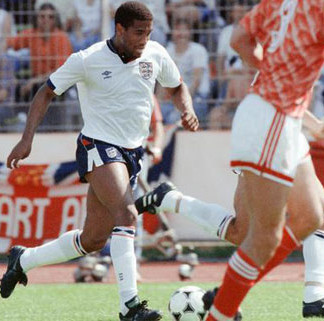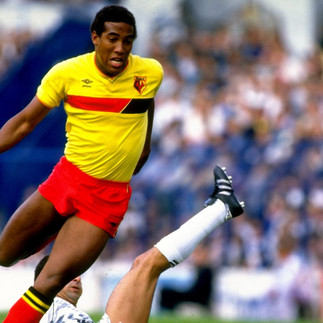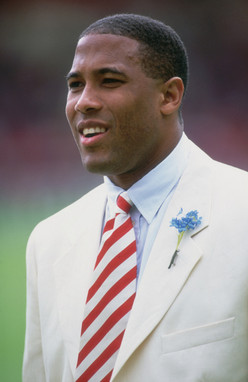May 10th: Today’s Feature
- webbworks333
- May 9, 2025
- 5 min read
May
John Charles Bryan Barnes MBE, born on November 7, 1963, is a former professional football player and manager who has left an indelible mark on the sport. Widely regarded as one of the greatest England players of all time, Barnes has made significant contributions both on and off the field. Currently, he is involved in various roles such as an author, commentator, and pundit for ESPN and SuperSport.

Early Life
Barnes was born in Jamaica to parents Roderick Kenrick "Ken" Barnes and Frances Jeanne Hill. Ken Barnes, originally from Port of Spain, Trinidad and Tobago, moved to Jamaica in 1956 as a member of the West India Regiment. Following Jamaica's independence in 1962, he joined the Jamaica Defence Force and became the commanding officer of the 1st Battalion Jamaica Regiment. Throughout his military career, he rose to the rank of colonel before retiring in 1989. During his time in the army, he not only excelled in his military duties but also showcased his talent as a semi-professional footballer for a Jamaica National Premier League club and as the captain of the Jamaica national football team.
Growing up in Jamaica's largest military base, Barnes had a disciplined upbringing and was heavily involved in sports from a young age. His father, who was the president of the Jamaica Amateur Swimming Association, instilled a love for sports in Barnes and even named him after the Welsh footballer John Charles. In 1973, Ken Barnes was promoted to the rank of Colonel and later served as the Defence adviser to the High Commission of Jamaica in London from 1976 to 1981. This appointment led to the family's relocation to London, where Barnes attended St Marylebone Grammar School and later Haverstock School in Camden Town. During his school years, he continued to pursue his passion for football by playing at the Stowe Boys Club in Paddington.
Barnes' upbringing in a sports-oriented family, coupled with his father's influence and support, played a significant role in shaping his athletic career. His move to London at a young age provided him with new opportunities to further develop his skills and passion for football. Despite the change in environment, Barnes continued to excel in sports and remained dedicated to his athletic pursuits. His early exposure to sports, coupled with his father's guidance and encouragement, laid the foundation for his successful career as a professional footballer and his contributions to both the military and sports communities.
Career
Initially known for his speed and skill as a left winger, Barnes transitioned to central midfield later in his career, showcasing his versatility and adaptability. Throughout his playing days, he achieved remarkable success, winning two League titles and two FA Cups with Liverpool. Additionally, he reached the FA Cup final with Watford, Liverpool, and Newcastle United, demonstrating his consistency and impact across different clubs.
Barnes' international career is equally impressive, earning 79 caps for England. Notably, he holds the record for the most caps by any black England player at the time of his retirement in 1995. His achievements on the field have solidified his status as a football legend, and his contributions to the sport continue to be recognised and celebrated.
Beyond his playing career, Barnes has ventured into coaching and management. He had a brief stint as the head coach of Celtic, working under his former Liverpool manager Kenny Dalglish. He also managed the Jamaica national team in 2008-09 and had a short spell at English club Tranmere Rovers in 2009. These experiences have allowed him to share his knowledge and expertise with aspiring players and teams.
Barnes' impact on the football world extends beyond his playing and coaching career. He has been honoured with prestigious awards, including being named the PFA Players' Player of the Year in 1987-88 and the Football Writers' Association Footballer of the Year twice in 1987-88 and 1989-90. In recognition of his remarkable contributions, he was inducted into the English Football Hall of Fame in 2005. Furthermore, he has received accolades from fans and experts alike, being voted Liverpool's best all-time player by FourFourTwo magazine and England's greatest-ever left-footed player by The Times readers in 2016. Barnes' legacy in the world of football is truly exceptional and continues to inspire future generations.
John Barnes, has released two notable books throughout his career. The first one, titled "John Barnes: The Autobiography," was published in 1999 and provided readers with a captivating insight into his life. Following the success of his autobiography, Barnes released his second book, "The Uncomfortable Truth About Racism," in 2021. This thought-provoking piece delves into the complex issue of racism and received widespread acclaim from readers and critics alike. Recognising his immense contributions, in 2022, Barnes was invited back to Liverpool as an official Club Ambassador, solidifying his enduring connection with the city and its football club.
Racism
Throughout his time as a player, Barnes, along with other Black players of his generation, faced racial abuse from fans in the stands. During one of his early games at Anfield, Barnes humorously pointed out that the tea lady had served tea to everyone except him, jokingly asking, "Is it because I'm Black?" He also witnessed racist remarks from his own teammates towards Black players on opposing teams.
In a notable incident during a Merseyside derby match against Everton, Barnes was targeted by a group of Everton supporters who threw a banana at him. In response, Barnes nonchalantly back-heeled the banana away while still in the middle of the game. This incident, captured in a photograph, highlighted the racism that Barnes and other Black players had to endure during that time.
The racial abuse faced by Barnes was not limited to fans in the stands, as he also encountered discrimination from opposition players and even some of his own teammates. Despite the challenges he faced, Barnes continued to excel on the field and became an iconic figure in the fight against racism in football.
Legacy
John Barnes was a football player who never failed to excite the crowd whenever he had possession of the ball. His exceptional passing ability, impressive first touch, and remarkable dribbling skills made him stand out. His style of play resembled that of a Brazilian, effortlessly gliding past defenders like a downhill skier. In his first season with Liverpool, the team emerged as league champions, and Barnes himself received the prestigious PFA and FWA awards.
Barnes's talent and impact on the game were recognised by the Football Writers' Association, who honoured him twice. This accolade places him in the company of esteemed players who have also received the award multiple times. Among them are legendary figures such as Sir Tom Finney, Sir Stanley Matthews, Danny Blanchflower, and Dalglish, who achieved this feat before Barnes. In more recent times, only Lineker, Thierry Henry, and Cristiano Ronaldo have managed to replicate this accomplishment.



































